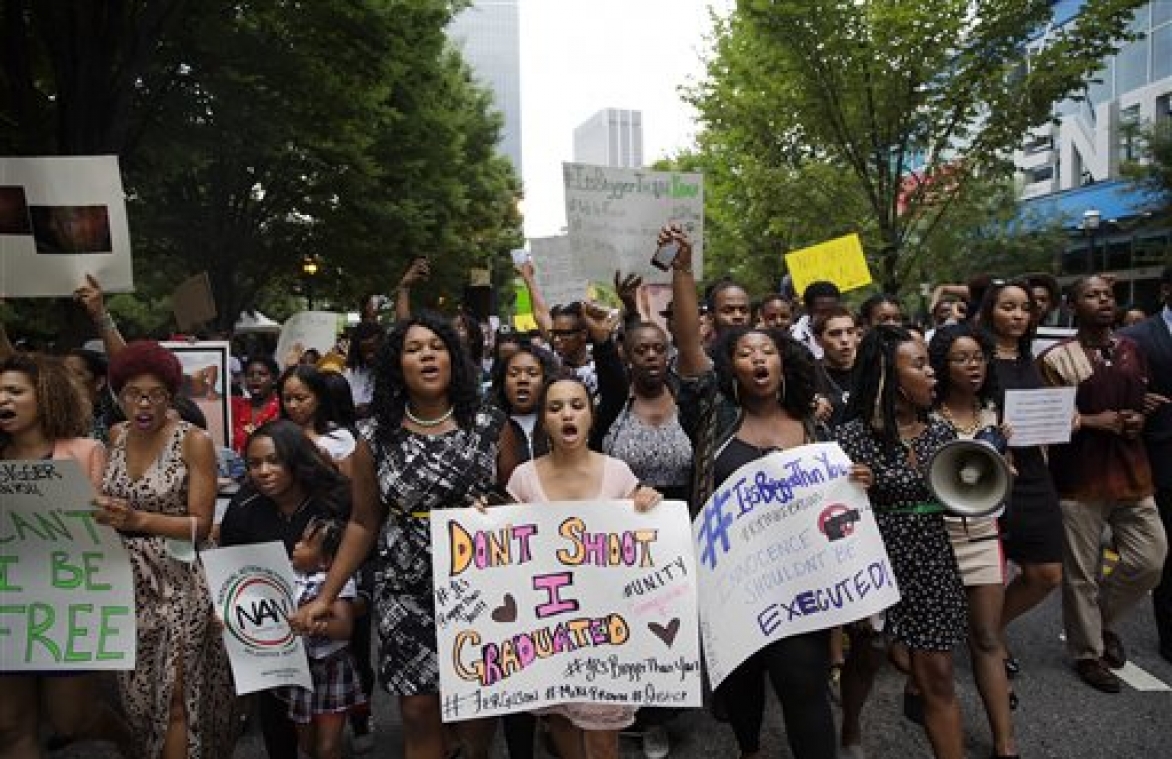An Atlanta police officer does not deserve qualified immunity for arresting a protester for disorderly conduct as the protester was recording the police, a federal appeals court panel has ruled. The appeals court panel emphasized that an individual has a First Amendment right to protest and to film the police.
The case arose out of a protest in downtown Atlanta after a grand jury refused to indict the police officer who shot and killed Michael Brown in Ferguson, Missouri. The Atlanta Police Department (APD) used a “leapfrogging” technique to block off the protesters’ route, which involved closing streets on a rolling basis to minimize traffic interruption rather than to shut down the protest entirely.
During the course of the protest, the APD ordered individuals to get on the sidewalks as they closed streets. At the intersection of Allen Boulevard and Peachtree Street, the APD ordered protesters to get on the sidewalks. Corey Toole, a protester, says that he complied with this order and got on the sidewalk while he was filming the police.
Man filming police during protest was arrested for disorderly conduct
However, Aaron Zorn, a sergeant with the APD, arrested Toole for disorderly conduct. Zorn contended that Toole refused to comply with the request to get off the street and onto the sidewalk.
Toole sued the APD and Zorn, alleging a violation of his Fourth Amendment right to be free from unreasonable searches and seizures and his First Amendment right to freedom of speech. Zorn argued that he was entitled to qualified immunity, a doctrine that protects government officials from liability unless they violated clearly established constitutional law principles.
A federal district court refused to grant Zorn qualified immunity. The district court reasoned that there were unresolved factual questions that would need to be resolved by a jury.
11th Circuit panel refuses to grant qualified immunity
On appeal, a three-judge panel of the 11th U.S. Circuit Court of Appeals affirmed in its December 26, 2019, decision in Toole v. City of Atlanta. The appeals court noted that at this stage of the proceeding, it has to take factual inferences in favor of the non-moving party – the party not moving for summary judgment – Toole.
There are clear factual disputes in the case. Toole claimed he was on the sidewalk filming the police on his phone when Zorn arrested him. Zorn, on the other hand, contends that Toole was in the public street and that Zorn has no idea whether Toole was recording the police on his phone at the time of the arrest.
The 11th Circuit panel emphasized that “the predominant intent of Toole’s presence at the scene was to exercise his First Amendment right to protest and film police conduct.” The appeals court also noted that such activities – “protesting and filming police conduct” – are constitutionally protected activities.
The 11th Circuit concluded: “Reading the facts in Toole’s favor, he was unlawfully arrested without probable cause while engaging in protected First Amendment conduct – protesting and filming police activities – specifically to stop him from doing so.” Thus, the appeals court reasoned that Zorn was not entitled to qualified immunity.
David L. Hudson Jr. is a First Amendment Fellow at the Freedom Forum Institute and a law professor at Belmont University who publishes widely on First Amendment topics. He is the author of a 12-lecture audio course on the First Amendment titled, “Freedom of Speech: Understanding the First Amendment” (Now You Know Media, 2018). He also is the author of many First Amendment books including, “The First Amendment: Freedom of Speech” (Thomson Reuters, 2012) and “Freedom of Speech: Documents Decoded” (ABC-CLIO, 2017).

